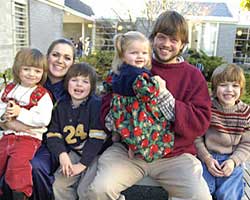Canadian court reopens door for U.S. war resisters
By
Dee Knight
Published Jul 10, 2008 8:56 PM
A Canadian court on July 4 ordered Canada’s Immigration and Refugee Board
to review U.S. war resister Joshua Key’s claim for asylum. In a ruling
that could affect many other U.S. war resisters, the court said,
“Military action which systematically degrades, abuses or humiliates
either combatants or non-combatants is capable of supporting a refugee
claim.”
|
Joshua and Brandi Key and their four
children at home in Canada.
Photo: Courage to Resist
|
The court concluded that the Immigration and Refugee Board imposed “a too
restrictive legal standard” on Key. In a clear statement affecting other
U.S. war resisters, the court also found that “similarly situated
individuals” should have their refugee claims reviewed.
Key’s lawyer, Jeffry House, said the ruling is “a huge victory for
numerous soldiers who are here [in Canada] and maybe others who are thinking of
coming here.” House himself is a Vietnam-era war resister. A spokeswoman
for Canadian Immigration Minister Diane Finley said her ministry was reviewing
the court decision, which adds another layer of pressure to let the war
resisters stay.
The decision could not come at a better time. A large-scale campaign is under
way in both Canada and the U.S. to press the Canadian government to stop the
deportation of Corey Glass, slated for July 10. Glass would be the first U.S.
war resister to be deported from Canada. The Toronto-based War Resisters
Support Campaign has led a massive effort in Canada to force the Canadian
government to stop his deportation and respect a majority vote in Parliament on
June 3 that called on the government to stop deportation of U.S. war resisters
and let them stay permanently.
A national poll in June showed that 64 percent of Canadians favor letting the
war resisters stay. Meanwhile, in the U.S., vigils and demonstrations are
taking place at Canadian consulates in 14 cities, organized by Courage to
Resist, Veterans For Peace, Iraq Veterans Against the War and Project Safe
Haven.
Elliott Adams, the national president of Veterans For Peace, will visit the Canadian
Embassy in Washington July 10 to deliver an “Open Letter to the Canadian
People and their Government.” The letter says, in part:
“U.S. soldiers, sailors, marines and airmen who have refused to
participate in this war have shown great moral courage. Unlike many governments
around the world, these war resisters are respecting international law and
following their own consciences. They witnessed war crimes with their own eyes.
They were sickened by the racist attitudes that the U.S. military fostered
toward the Iraqi people. Some are struggling with the psychological wounds of
war, commonly known as Post Traumatic Stress Syndrome.
“So it is from the bottom of our hearts that we thank the many Canadians
who have sheltered our war resisters,” the letter says, and concludes
with a strong demand that the Canadian government respect the Parliamentary
vote and the will of the Canadian people, and let the war resisters stay.
Joshua Key went to Canada with his wife Brandi and their four small children
following 16 months living underground in the United States after he decided
not to return to Iraq. He served as a combat engineer in Iraq for eight months
in 2003. His book, “The Deserter’s Tale,” has been an
international best seller. He said he and his family have felt support from
“about 95 percent of the Canadian people.”
Key’s lawyer, Jeffry House, said there are about 200 U.S. war resisters
in Canada now. While that is “no comparison to the later period of the
Vietnam War,” he said, it does compare with the early Vietnam War period.
“Early on during Vietnam there were only a small number, but later the
doors opened more widely,” he said. “By November 1969 [Canadian
Prime Minister] Trudeau declared Canada ‘should be a refuge from
militarism,’ and the doors opened and people flooded in.” More than
50,000 U.S. war resisters found refuge–or a new home–in Canada
during the Vietnam War.
According to Gerry Condon of Project Safe Haven, making it possible for war
resisters to stay in Canada is an integral part of building the GI resistance.
Articles copyright 1995-2012 Workers World.
Verbatim copying and distribution of this entire article is permitted in any medium without royalty provided this notice is preserved.
Workers World, 55 W. 17 St., NY, NY 10011
Email:
[email protected]
Subscribe
[email protected]
Support independent news
DONATE


